|
CrimeFest
CrimeFest was back in Bristol last month with writers and readers delighted simply to meet and talk in the flesh rather than online for the first time in three years. Naturally there were panels of speakers, but the serious discussions tended to be in the surrounding bars and restaurants as old friends were reunited, old enemies avoided and new contacts made.

There were several notable absentees: Samantha Norman after finding herself double-booked at a charity event, Nev Fountain after a positive Covid test and Ali Karim due to a family bereavement. Saddest of all was the absence of Thalia Proctor, who died aged 52 in April, though her parents attended in her memory.
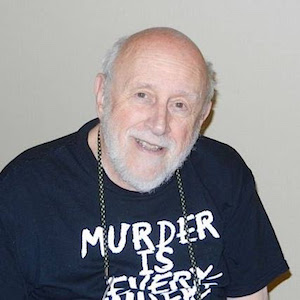
Personally I missed the presence of regular American delegate Bill Gottfried, who died in 2021 aged 85. Bill, a doctor with slightly unhealthy interest in fictional murder, always used to sit in the front row of the panels I was on and always asked the first question, always a thoughtful and incisive one. I made a habit at CrimeFest of having breakfast with Bill and his wife Toby, found them both excellent company and frighteningly well-read in crime fiction. Every time we met, Bill would express his admiration (perhaps not quite the right word) for my habit of wearing a tie, claiming that the last one he owned had been torn off and thrown away on the day he left the U.S. Army.
After one panel, Bill’s question to me was how had I adapted to writing about Albert Campion after my ‘Angel’ series. I said, flippantly, that I had had ‘to clean up my act’ at which point, Bill growled loudly: ‘I’ll say you did.’
A very welcome surprise appearance at CrimeFest, at least to me, was that of thriller-maestro Simon Kernick, whose latest, Good Cop, Bad Cop [Hodder] is out in paperback this month.
Party Scene
Publishing parties are back on the menu with a vengeance after the Covid-induced quarantine of recent years and at one of the first out of the blocks, it was a delight to meet Irish rising star Jo Spain in the company of Barry Forshaw in a trendy Covent garden eatery.

I have already raved about Jo’s new novel The Last To Disappear [Quercus] and was impressed to hear that she is now writing for television, working with high-rollers such as Jed Mercurio. Success has not gone to her head, though, and she was suitably depressed that promotional activities in England had meant she missed the latest episode of Derry Girls and I had to restrain myself from spoiling it for her. Most impressive was her attitude to her writing, which she summed up as ‘I always look at what I’ve written and think: how can I make this better?’

CrimeFest saw a plethora of party, sorry, work event, invitations from publishers which resulted in excellent business for the bars and restaurants of Bristol, some of them running dangerously low on victualling supplies. Few escaped the attention of the wandering paparazzi, including, as here, the traditional Severn House dinner in one of the dockside’s fashionable hipster establishments.
Back in London, to celebrate Anthony Horowitz’s latest James Bond novel, With A Mind To Kill [Jonathan cape], my Shots colleague, the voluptuous Ayo Onatade and I posed with Anthony in an attempt to recreate the picture taken at the launch of his Magpie Murders six years ago.
 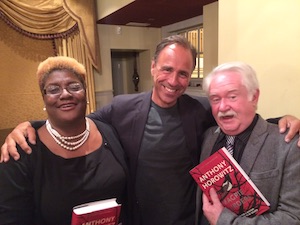
The splendid, champagne-fuelled event was held at the famous Langan’s Brasserie in Mayfair, an establishment which, in a past life, I had often frequented although until now, I had never been upstairs at Langan’s.
French Leave
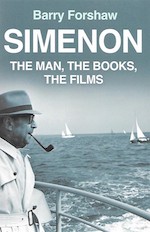 Barry Forshaw, a modern day Karl Baedeker when it comes to crime fiction, has a new book out next month: Simenon, The Man, The Books, The Films [Oldcastle Books] in which he catalogues the works of that prolific Belgian writer Georges Simenon and their numerous screen interpretations. Barry Forshaw, a modern day Karl Baedeker when it comes to crime fiction, has a new book out next month: Simenon, The Man, The Books, The Films [Oldcastle Books] in which he catalogues the works of that prolific Belgian writer Georges Simenon and their numerous screen interpretations.
For most British readers, or perhaps that should be television viewers, Simenon equals ‘Maigret’ and images of Rupert Davies, Michael Gambon or - Mon Dieu!- Rowan Atkinson spring to mind depending on one’s age. Reading Barry’s book I realised that I had never actually seen a French version of a Maigret story although there were several starring Jean Gabin as the eponymous Inspector. Being belligerently ignorant of French cinema, I am not surprised by this and have to admit that whenever I hear the name Jean Gabin, I automatically think of the dog in the wonderful Dix Pour Cent.
Barry’s new book comes blurbed with a host of positive revies for his previous guides to the genre, including one from me: There is much to inform and entertain here with, as one might expect from film-buff Barry, lots of added-value nuggets on films based on crime novels.
I cannot remember which book I said that about, but I am happy to say exactly the same about this one.
Size Does Matter
I was depressed to receive yet another crime novel for review which weighed in at 440+ pages, making it the ninth long (long-winded?) proof this month. (I have, so far, been sent 46 crime novels to be published between now and early August and one fellow reviewer on a national newspaper has already received an advance proof of a book coming out in January 2023.)
To cheer myself up and thanks to the wonders of the jolly old interweb, I have treated myself to first editions of two classic thrillers from favourite authors:

First published in 1971, The Blind Side by Francis Clifford, does its job and does it brilliantly in 224 pages, whilst the more expansive, but always reliable Eric Ambler told his 1964 tale, A Kind of Anger in 250 pages, and not one was wasted.
I realise that my gripe against the size of, dare I say it, overblown ‘psychological thrillers’ is probably a factor of age. I can still remember novels by Ruth Rendell and Margaret Yorke which today would be labelled Domestic Noir from the 1970s, serving up generous portions of suspense and unease in less than 200 paperback pages.
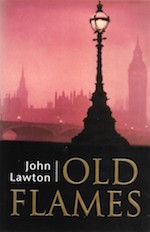 And at my great age, it does matter when it comes to the size of print. I recently remarked to my old sparring partner John Lawton that I owned a 2012 paperback of his novel Old Flames but had never managed to read it because the print was so small. With hardly any further prompting, he kindly sent me a hardback first edition where the print is larger and clearer. And at my great age, it does matter when it comes to the size of print. I recently remarked to my old sparring partner John Lawton that I owned a 2012 paperback of his novel Old Flames but had never managed to read it because the print was so small. With hardly any further prompting, he kindly sent me a hardback first edition where the print is larger and clearer.
I am sure I will enjoy all 411 pages of it, as John Lawton is not only a fine exponent of historical spy fiction, but is an author who knows how to treat a pensioner with failing eyesight.
Souvenir
Speaking of fine thriller writers (and Eric Ambler in particular), it was thirty-eight years ago this month that Ambler was whisked off to a surprise 75th birthday lunch at The Savoy, a party thrown by his contemporaries.

I have recently discovered that a souvenir menu card autographed by all the famous names present was sold at auction in Cirencester in 2018, but for how much I do not know.
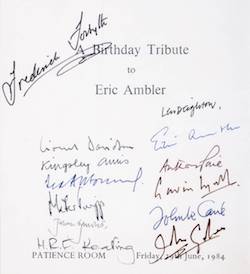
|
|
Books of the Month
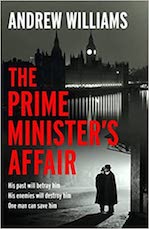 Given the present incumbent of 10 Downing Street, a book with the title The Prime Minister’s Affair probably wouldn’t cause any great gasps of surprise. What should is that in Andrew Williams’ new novel from Hodder, a fine example of a historical spy thriller (anyone familiar with Andrew Williams’ work won’t be surprised in the slightest at that), the prime minister in question is Ramsey Macdonald. Given the present incumbent of 10 Downing Street, a book with the title The Prime Minister’s Affair probably wouldn’t cause any great gasps of surprise. What should is that in Andrew Williams’ new novel from Hodder, a fine example of a historical spy thriller (anyone familiar with Andrew Williams’ work won’t be surprised in the slightest at that), the prime minister in question is Ramsey Macdonald.
Set in 1929 and 1930, as the Great Depression tightens its grip, Britain’s first Labour prime minister is in his second term of office, his first having ended, it was rumoured, by a political scandal engineered by MI5. Now he faces a much more personal scandal as a former lover armed with some very passionate letters turns up demanding money to prevent exposure in the slavering Tory press. Given his earlier experience, Macdonald is not likely to trust the secret service to retrieve the damaging letters, so he decides in effect to go private, initially by asking a favour of Sir Oswald Mosley(!) and then finds his fate in the hands of a rogue agent who is almost as cynical about his employers in the secret service as he is.
As the action moves to Paris, the internecine warfare within the secret service intensifies and freelance fascist thugs, Italian and British (including the later to be notorious William Joyce) orchestrate the boot-and-fist violence with relish. The is spy tradecraft of the old school, with no computers, fast cars or mobile phones, but not a whit less exciting for that. Highly recommended as both a spy story and a piece of social and political history.
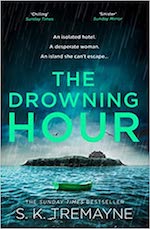 S.K. Tremayne, in his new suspense thriller The Drowning Hour [HarperCollins], takes great liberties with the geography of the Essex coastline, but then again, who hasn’t? He narrates this wonderfully creepy tale through two sisters, one of whom is dead and the other fearing for her sanity trapped by a traumatic (water) phobia on an island in the Blackwater estuary. S.K. Tremayne, in his new suspense thriller The Drowning Hour [HarperCollins], takes great liberties with the geography of the Essex coastline, but then again, who hasn’t? He narrates this wonderfully creepy tale through two sisters, one of whom is dead and the other fearing for her sanity trapped by a traumatic (water) phobia on an island in the Blackwater estuary.
The island is uninhabited apart from an exclusive luxury hotel, its guests (who are hardly mentioned) and staff gradually deserting the place as business drops off dramatically following a mass accidental drowning in a violent cross-current at the appointed, as it were, hour. {As an aside, I had no idea the River Blackwater had a fleet of ‘water-taxis’. You’ll be telling me next they have Ubers in Tolleshunt D’Arcy.}Eventually only the surviving sister is left in the dark and deserted hotel, conversing with a ghost, to discover the secret the hotel hides, which, despite juicy hints of witchcraft and Tarot Cards, turns out to be a very mortal crime rather than anything supernatural. In a way this is slightly disappointing as S. K. Tremayne is chillingly good at creating a spooky atmosphere.
One niggle, though. Why does a luxury hotel with a high-class restaurant (Michelin stars pending) on the Blackwater serve Brancaster oysters from Norfolk rather than the world famous Colchester Natives from nearby Mersea?
 I am told that Seicho Matsumoto (1909-1992) is regarded, by the French, as ‘the Simenon of Japan, and I can see why. His prose is spare, almost cut to the bone and his characters do indeed chew over tiny plot points like a dog worrying a bone. Tokyo Express, which I think dates from 1957 but is now published in English for the first time by Penguin Classics, has a lot of trains in it, or rather train timetables, as two detectives, several hundred miles apart, investigate the double ‘love suicide’ – something which hardly causes a raised eyebrow in Japan – which might just be a double murder, the trail leading them from the southern island of Kyushu to the northern one of Hokkaido. I am told that Seicho Matsumoto (1909-1992) is regarded, by the French, as ‘the Simenon of Japan, and I can see why. His prose is spare, almost cut to the bone and his characters do indeed chew over tiny plot points like a dog worrying a bone. Tokyo Express, which I think dates from 1957 but is now published in English for the first time by Penguin Classics, has a lot of trains in it, or rather train timetables, as two detectives, several hundred miles apart, investigate the double ‘love suicide’ – something which hardly causes a raised eyebrow in Japan – which might just be a double murder, the trail leading them from the southern island of Kyushu to the northern one of Hokkaido.
The novel, and the case, is all about breaking the seemingly solid alibi of the prime suspect and this involves enough detail on Japanese railways to keep even the most die-hard Freeman Wills Croft fan happy. Despite this, Tokyo Express is strangely addictive and reminds me of the early Sjowall & Wahloo novels, with the bonus of some tantalising glimpses of a post-war Japanese society where it is felt necessary to apologise for drinking coffee instead of tea.
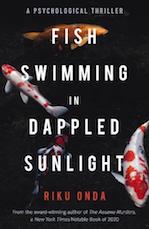 A more modern take on the Japanese obsession with ‘love suicide’ figures in Fish Swimming In Dappled Sunlight [Bitter Lemon] by Riku Onda, though that is not the main thrust of this thoughtful, intense psychological thriller revolving around the mental sparring between two lovers in the process of breaking up and going their separate ways. A more modern take on the Japanese obsession with ‘love suicide’ figures in Fish Swimming In Dappled Sunlight [Bitter Lemon] by Riku Onda, though that is not the main thrust of this thoughtful, intense psychological thriller revolving around the mental sparring between two lovers in the process of breaking up and going their separate ways.
They narrate alternate chapters and gradually reveal that they may be more than young lovers and that one of them may have murdered a man on a recent trekking holiday. The action, such as it is, is recounted over one last night in the couple’s empty flat, as realisation follows recrimination and they attempt to untwist a web of guilty memories.
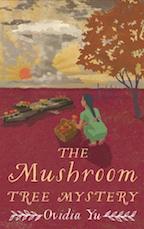 For some reason I have missed out on Singaporean author Ovidia Yu’s ‘Crown Colony’ series of mysteries featuring the young polio-crippled Su Lin as her regular amateur detective heroine. The Mushroom Tree Mystery [Constable] is the sixth in the series and, being honest, it is probably best read after the first five, which establish a variety of recurring characters, their backgrounds and relationships and their present situation. For some reason I have missed out on Singaporean author Ovidia Yu’s ‘Crown Colony’ series of mysteries featuring the young polio-crippled Su Lin as her regular amateur detective heroine. The Mushroom Tree Mystery [Constable] is the sixth in the series and, being honest, it is probably best read after the first five, which establish a variety of recurring characters, their backgrounds and relationships and their present situation.
This is important because the setting is vitally important – and fascinating – as the ‘Crown Colony’ in question is Singapore under Japanese occupation during WWII, where the invaders were welcomed by some as liberators whilst others soon realised they had swapped one imperial overlord for another. Add into the mix the fact that Mushroom Tree is set in August 1945, a new type of bomb has been dropped on Hiroshima, an eccentric, blind Japanese scientist is rumoured to have rigged gas bombs with which to greet the victorious allied armies, which could also see the massacre of the POWs in Changi prison, the ‘colony’ is being bombed and food is short, plus there are two murders connected to a missing briefcase of secret documents.
Singapore (Syonon to the Japanese) under siege is very well done, both historically and atmospherically, and Su Lin is a sympathetic protagonist struggling under the triple disabilities of being a polio victim, not Japanese and female.
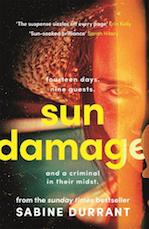 Any book which starts with epigraphs quoting Winston Graham (yes, the Poldark guy but he also authored terrific novels of suspense) and Jim Thompson, immediately gets my attention, especially when the Jim Thompson reference is from The Grifters. That little homage is entirely appropriate as Sabine Durrant’s new novel Sun Damage [Hodder] is all about grifting. Any book which starts with epigraphs quoting Winston Graham (yes, the Poldark guy but he also authored terrific novels of suspense) and Jim Thompson, immediately gets my attention, especially when the Jim Thompson reference is from The Grifters. That little homage is entirely appropriate as Sabine Durrant’s new novel Sun Damage [Hodder] is all about grifting.
A pair of young, fairly hip (on the surface, but damaged underneath) confidence tricksters, having grifted their way from Thailand to Morocco, find themselves weighing up a mark in the south of France. The planned con goes disastrously wrong – or does it? – and the younger, female half of the grifting team cuts and runs with the pair’s accumulated loot. Taking a leaf out of The Talented Mr Ripley’s playbook, she adopts a new identity and cons her way into a job as a cook and housekeeper for as family of middle-class English holiday makers who have rented a villa, quickly discovering that all of them have secrets themselves. Wracked with guilt, she finds the screw tightening as her former partner in crime finally finds her; but then, you just can’t keep a good grifter down.
Sun Damage is cleverly narrated through the voice of the female confidence trickster, whose back story explains her drift into grift, and some of the scenes with the awful family she has to cook for (with only the skimpiest grasp of cuisine Ottolenghi) are toe-curlingly good. A surprisingly non-violent psychological thriller and highly entertaining, though not recommended if you plan on renting a French villa this summer.
Forthcoming
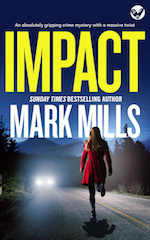 I am especially looking forward to the new novel by Mark Mills, the author of some fine historical spy thrillers such as The Information Officer and House of the Hanged, although for some reason (probably legal) I have not seen his more recent work. I am especially looking forward to the new novel by Mark Mills, the author of some fine historical spy thrillers such as The Information Officer and House of the Hanged, although for some reason (probably legal) I have not seen his more recent work.
I am told that Impact, published in July by Joffe Books, is something of a departure for Mark, but knowing what a fine writer he is, that only heightens my expectations.
And I have already pencilled in a reading week for January 2023, which sees the publication from Bloomsbury of Love Me Fierce in Danger, the first (?) biography of the self-styled ‘Demon Dog’ of American crime fiction James Ellroy, by Steve Powell of Liverpool University.
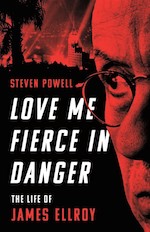
You Didn’t See This
Given my appalling track record of jinxing books by recommending them for awards, I will say nothing more than I am extremely pleased to see that The Plant Hunter by T.L. Mogford [Welbeck] is on the shortlist for this year’s Wilbur Smith Adventure Writing Prize. As the prize is actually £10,000, I am fairly sure that Tom will be buying the first round...
The Devil You Know
(in a language you might not)
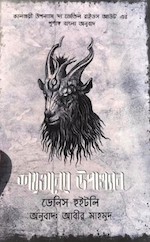 I always take notice of unusual covers even if I cannot understand the language a book is published in and this one - thanks to a colleague on the Dennis Wheatley website - certainly caught my eye. I always take notice of unusual covers even if I cannot understand the language a book is published in and this one - thanks to a colleague on the Dennis Wheatley website - certainly caught my eye.
It is a new edition of Wheatley’s famous 1934 black magic thriller The Devil Rides Out to be published in Bangladesh, which just shows that you can’t keep a good villain down.
Rebus Pursuivant
Congratulations to Sir Ian Rankin on his knighthood in the recent Honours List (which I still scour though out of habit rather than expectation these days), as well as his success in the British Book Awards for The Dark Remains [Canongate]. The news of both coincided with Ian featuring in the ‘My Culture Fix’ section in The Times. Many of his choices – such as his favourite author being Muriel Spark and his guilty pleasure Jilly Cooper (or rather her books) - were already known, others were somewhat surprising.
It was good to note that the book he is currently reading is Ted Lewis’ Jack Carter’s Law and the book he wished he had written is Bleak House. I was slightly surprised that he chose Gregory’s Girl as his favourite film (though there’s nothing wrong with that) over Goodfellas, which he used to go on about endlessly. What shocked me slightly was that he admitted to never having read The Hound of the Baskervilles and the ‘bad’ book he couldn’t finish was Norman Mailer’s Ancient Evenings, which I think is a tad unfair. Mailer has written far worse books; just ask Gore Vidal.
Pip! Pip!
The Ripster
|